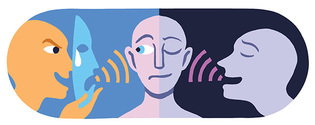 loading
loading
FindingsListening is underratedWe may understand people from their voices better than from their faces.  Gregory NemecView full imageWhen somebody tells you something, the meaning of what they say is conveyed partly by how they say it—inquisitively or in a conspiratorial whisper. It turns out these aural cues are quite strong. Listening to the voice by itself, without looking at the speaker, could be the most effective way to apprehend emotional states. “Relying on a combination of vocal and facial cues, or solely facial cues, may not be the best strategy for accurate emotion recognition,” writes the School of Management’s Michael Kraus in American Psychologist. In a series of experiments, Kraus tested how well people understood each other under three different conditions: watching what someone says without hearing what they say; watching and hearing someone as they speak; and hearing what someone says without seeing them. Voice-only communication generally elicited the highest rates of “empathic accuracy.” Kraus offers two explanations for this result. First, people are quite good at using facial expressions to mask emotional states, but doing the same with one’s voice is far more challenging, “making leakage of internal states more likely.” Second, our proven inability to multitask implies that trying to listen to what someone says and how they say it, while also monitoring facial expressions, could tax comprehension. “Having more modalities for emotion recognition might paradoxically impede empathic accuracy,” Kraus writes. He notes that these results had a particular context: he was testing people who were strangers to each other and had no obvious reason to lie. Different circumstances might affect the findings. People who know each other well, for instance, are often expert at recognizing emotion through facial expression. The voice-only advantage, he writes, may be “confined to stranger interactions.” Even so, the findings raise the possibility that understanding another person may require us to—literally—just listen.
The comment period has expired.
|
|